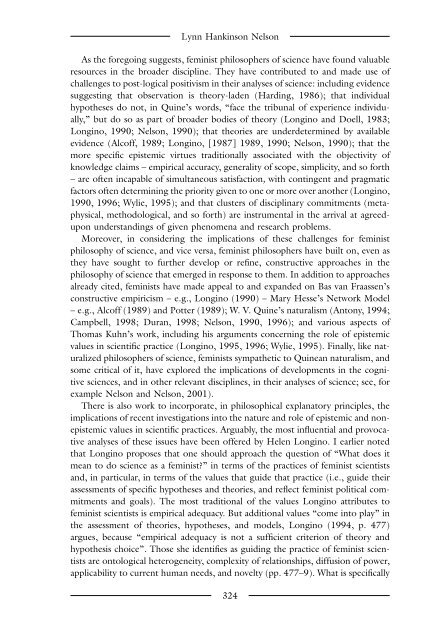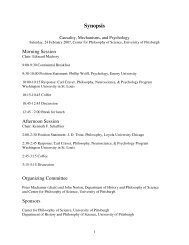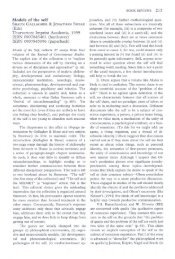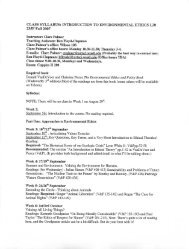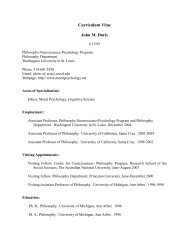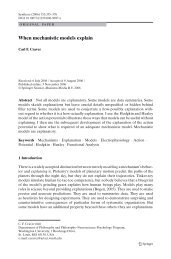The Blackwell Guide to the Philosophy of Science - The Department ...
The Blackwell Guide to the Philosophy of Science - The Department ...
The Blackwell Guide to the Philosophy of Science - The Department ...
Create successful ePaper yourself
Turn your PDF publications into a flip-book with our unique Google optimized e-Paper software.
Lynn Hankinson Nelson<br />
As <strong>the</strong> foregoing suggests, feminist philosophers <strong>of</strong> science have found valuable<br />
resources in <strong>the</strong> broader discipline. <strong>The</strong>y have contributed <strong>to</strong> and made use <strong>of</strong><br />
challenges <strong>to</strong> post-logical positivism in <strong>the</strong>ir analyses <strong>of</strong> science: including evidence<br />
suggesting that observation is <strong>the</strong>ory-laden (Harding, 1986); that individual<br />
hypo<strong>the</strong>ses do not, in Quine’s words, “face <strong>the</strong> tribunal <strong>of</strong> experience individually,”<br />
but do so as part <strong>of</strong> broader bodies <strong>of</strong> <strong>the</strong>ory (Longino and Doell, 1983;<br />
Longino, 1990; Nelson, 1990); that <strong>the</strong>ories are underdetermined by available<br />
evidence (Alc<strong>of</strong>f, 1989; Longino, [1987] 1989, 1990; Nelson, 1990); that <strong>the</strong><br />
more specific epistemic virtues traditionally associated with <strong>the</strong> objectivity <strong>of</strong><br />
knowledge claims – empirical accuracy, generality <strong>of</strong> scope, simplicity, and so forth<br />
– are <strong>of</strong>ten incapable <strong>of</strong> simultaneous satisfaction, with contingent and pragmatic<br />
fac<strong>to</strong>rs <strong>of</strong>ten determining <strong>the</strong> priority given <strong>to</strong> one or more over ano<strong>the</strong>r (Longino,<br />
1990, 1996; Wylie, 1995); and that clusters <strong>of</strong> disciplinary commitments (metaphysical,<br />
methodological, and so forth) are instrumental in <strong>the</strong> arrival at agreedupon<br />
understandings <strong>of</strong> given phenomena and research problems.<br />
Moreover, in considering <strong>the</strong> implications <strong>of</strong> <strong>the</strong>se challenges for feminist<br />
philosophy <strong>of</strong> science, and vice versa, feminist philosophers have built on, even as<br />
<strong>the</strong>y have sought <strong>to</strong> fur<strong>the</strong>r develop or refine, constructive approaches in <strong>the</strong><br />
philosophy <strong>of</strong> science that emerged in response <strong>to</strong> <strong>the</strong>m. In addition <strong>to</strong> approaches<br />
already cited, feminists have made appeal <strong>to</strong> and expanded on Bas van Fraassen’s<br />
constructive empiricism – e.g., Longino (1990) – Mary Hesse’s Network Model<br />
– e.g., Alc<strong>of</strong>f (1989) and Potter (1989); W. V. Quine’s naturalism (An<strong>to</strong>ny, 1994;<br />
Campbell, 1998; Duran, 1998; Nelson, 1990, 1996); and various aspects <strong>of</strong><br />
Thomas Kuhn’s work, including his arguments concerning <strong>the</strong> role <strong>of</strong> epistemic<br />
values in scientific practice (Longino, 1995, 1996; Wylie, 1995). Finally, like naturalized<br />
philosophers <strong>of</strong> science, feminists sympa<strong>the</strong>tic <strong>to</strong> Quinean naturalism, and<br />
some critical <strong>of</strong> it, have explored <strong>the</strong> implications <strong>of</strong> developments in <strong>the</strong> cognitive<br />
sciences, and in o<strong>the</strong>r relevant disciplines, in <strong>the</strong>ir analyses <strong>of</strong> science; see, for<br />
example Nelson and Nelson, 2001).<br />
<strong>The</strong>re is also work <strong>to</strong> incorporate, in philosophical explana<strong>to</strong>ry principles, <strong>the</strong><br />
implications <strong>of</strong> recent investigations in<strong>to</strong> <strong>the</strong> nature and role <strong>of</strong> epistemic and nonepistemic<br />
values in scientific practices. Arguably, <strong>the</strong> most influential and provocative<br />
analyses <strong>of</strong> <strong>the</strong>se issues have been <strong>of</strong>fered by Helen Longino. I earlier noted<br />
that Longino proposes that one should approach <strong>the</strong> question <strong>of</strong> “What does it<br />
mean <strong>to</strong> do science as a feminist?” in terms <strong>of</strong> <strong>the</strong> practices <strong>of</strong> feminist scientists<br />
and, in particular, in terms <strong>of</strong> <strong>the</strong> values that guide that practice (i.e., guide <strong>the</strong>ir<br />
assessments <strong>of</strong> specific hypo<strong>the</strong>ses and <strong>the</strong>ories, and reflect feminist political commitments<br />
and goals). <strong>The</strong> most traditional <strong>of</strong> <strong>the</strong> values Longino attributes <strong>to</strong><br />
feminist scientists is empirical adequacy. But additional values “come in<strong>to</strong> play” in<br />
<strong>the</strong> assessment <strong>of</strong> <strong>the</strong>ories, hypo<strong>the</strong>ses, and models, Longino (1994, p. 477)<br />
argues, because “empirical adequacy is not a sufficient criterion <strong>of</strong> <strong>the</strong>ory and<br />
hypo<strong>the</strong>sis choice”. Those she identifies as guiding <strong>the</strong> practice <strong>of</strong> feminist scientists<br />
are on<strong>to</strong>logical heterogeneity, complexity <strong>of</strong> relationships, diffusion <strong>of</strong> power,<br />
applicability <strong>to</strong> current human needs, and novelty (pp. 477–9). What is specifically<br />
324


